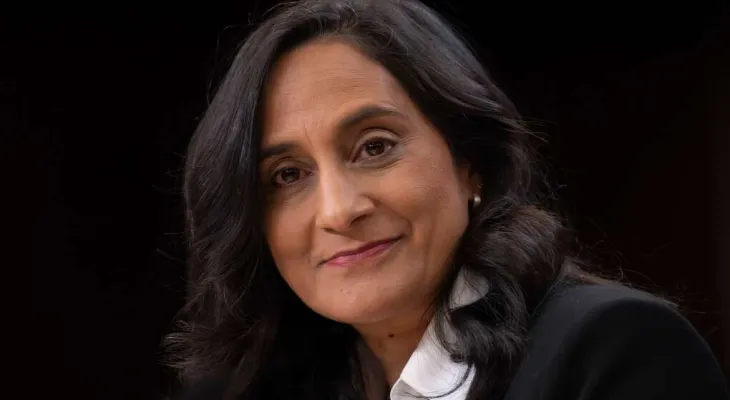Search here
Newspaper
Search here

Arab Canada News
News

Published: April 29, 2024
Corporate boards. Military barracks. Federal government offices, they are not areas known for promoting diversity, so Anita Anand is trying to change that.
She stated during a recent interview that ensuring people from all backgrounds feel accepted and heard, regardless of the setting, is a mission she has pursued at every stage of her life and career.
Anand, the first person of color to hold federal government responsibility as Chair of the Treasury Board, said, "It is a very personal issue for me," adding, "I still walk into rooms and see the tables that are not diverse."
For example: In February, Anand attended a briefing session on mental health consultations for Black public service workers.
She added that there were no Black employees in the room, "I asked the individuals who briefed me: Why are there no Black individuals facing me? That's unacceptable."
Part of her mandate is to dismantle the systemic barriers in the federal public service that allow workplace harassment, bullying, racism, and other forms of discrimination and violence to fester.
She said that this needs to happen at all levels.
"We actually want to make sure we see diversity in the minister’s briefings, at the deputy minister level, and at the assistant deputy minister level."
Anand is no stranger to what racial discrimination can feel like.
Before becoming a Member of Parliament for Oakville, Ontario, in 2019, she worked as a lawyer and law professor.
She said that in one workplace, people often asked if she worked in the accounting department.
She added, "I found that shocking because the number of South Asians in the accounting department was larger than in the law faculty."
"And often I was confused with other Indian women who worked in the same workplace I was in."
Instead of dwelling on such incidents, she said she put more energy into understanding how to improve the situation.
This included working at the United Nations, writing a thesis on racial discrimination in Canada, and researching the number of racialized individuals on boards when she was a professor.
Anand said, "At every stage of my life, I have tried to weave my perspectives on diversity and inclusion into everything I do."
"It’s not that I have to try to do this; it’s a natural part of the way I think."
Anand said it is hard to pinpoint a moment in time when she recognized her racial identity.
"I would just say that it was very stark for me growing up."
Her Indian parents met in Ireland in the 1950s as doctors, married in England, and then lived in India and Nigeria before migrating to Canada.
She said, "They raised their three daughters in a predominantly white county with very few South Asian residents when they moved."
"We grew up wonderfully in Kentville, Nova Scotia, but the fact that I was racialized never left my consciousness. There weren't many people who looked like me and my sisters in my school."
Part of her goal now is to ensure that children who face racism can see themselves in all types of jobs, including high-level government and military roles.
As Minister of Defence, Anand said she told her team that cultural change is something "that should not leave the center of my office."
In the months leading up to her taking on the role in the fall of 2021, several senior military leaders were accused of sexual misconduct.
After just over half a year into her term, Supreme Court Justice Louise Arbour released findings from an external review, stating that the culture within the Canadian Armed Forces was "severely lacking."
Anand accepted Arbour's recommendations for change, acknowledging in a statement on the anniversary of it in May 2023 that "change does not happen overnight, and it will not endure without effort."
She was tasked with overseeing the public service last July.
Anand stated there are about 80,000 people in the Canadian forces, but the number is closer to 275,000 individuals in the entire public service.
She added that the issues of that larger group seem to have been placed under the radar.
She said, "It may be related to issues of sexual misconduct, and it may be more apparent because of the clear hierarchy in uniform and insignia in the Canadian Armed Forces, compared to the public service, where we don’t wear uniforms."
"But the issues are clear."
A panel of experts hired by the Treasury Board to assist with workplace culture recommended major changes, including implementing mandatory training on racism, discrimination, and harassment.
The panel also said employees should have access to mental health counseling, and managers need training in trauma-informed leadership.
While reviewing the recommendations, Anand said she would chart a path forward, with an action plan ready to start before the summer.
She said she will not leave the center of her office, "that is not something I should worry about if I am going to remember it."
"It expresses who I am."
Comments